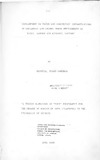| dc.contributor.author | Mairura, Evans O | |
| dc.date.accessioned | 2016-06-20T06:15:49Z | |
| dc.date.available | 2016-06-20T06:15:49Z | |
| dc.date.issued | 1988 | |
| dc.identifier.uri | http://hdl.handle.net/11295/96157 | |
| dc.description.abstract | An adequate water supply and sanitation service constitute basic human needs so that a human settlement with inadequate development of the same can best be regarded- as unplanned. In this respect Kitui, Kanuku and Kinyago villages of Nairobi can be described as unplanned. The study area is one of the low-income urban settlements that are often referred to as either squatter settlements, uncontrolled settlements, or occassionally as temporary settlements.
The objectives of this thesis is to assess the influence of those factors that explain the development of water supply and sanitation services in unplanned settlements and therefore to determine how best to develop these services. Findings from the study area show that the development of these services is largely in the hands of the residents. Unfortunately, indications are that their efforts have not been effective. A comparative assessment shows that sanitation is worst hit. Ironically the development of an increased water supply now poses a more serious sanitation problem arising from inadequate provision to handle the waste water generated thereof. Poor site conditions, socio-economic factors, institutional constraints, and lack of support services all act
simultaneously to inhibit an effective development of the infrastructural services. It is also true to state that the development of water supply and sanitation infrastructure goes beyond just the mere provision of facilities; it calls for a properly designed and managed system otherwise the same facilities turn out to pose worse environmental problems to the same beneficiaries. Housing development faces major investment decisions that revolve around making decisions in a field full of competing and conflicting interests. In this respect Maslow's principle of 'hierarchy of needs' appears to prevail. So that households first invest in the house structure unit before investing in services like sanitation. Unfortunately, the result is that this is only at the expense of the degradation of environmental conditions that threaten the survival of not only the residents, but also the larger urban community.
Among
the
major
recommen
dations that
have been
put forward
i n
this
thes is
is
the need to
prioritise
investment
resources
so as
to
reflect the
real
aspirations of man, not just in the study area but also in the larger urban environment. In this respect sanitation infrastructure is accorded priority.
Nevertheless, water and sanitation services together with other support services need to be developed as a package-whole. Any upgrading and improved development of unplanned settlements must however be perceived within a wider perspective of the total urban system. Therefore Nairobi City Commission has an obligation to ensure the attainment of an improved living environment within the urban area. The sooner the environment is saved from further degeneration the better.
This thesis has put forward some policies and engineering model designs that call upon committed efforts by a wider body of planners and the society at large. Further research on appropriate sanitation technologies are proposed to ensure a balanced natural environment. The benefits to be derived thereof are immense but only after concerted efforts, the cost to society notwithstanding. | en_US |
| dc.language.iso | en | en_US |
| dc.publisher | University of Nairobi | en_US |
| dc.rights | Attribution-NonCommercial-NoDerivs 3.0 United States | * |
| dc.rights.uri | http://creativecommons.org/licenses/by-nc-nd/3.0/us/ | * |
| dc.subject | Water and sanitation, low-income Urban settlements, of kitui,Kanuku and Kinyago | en_US |
| dc.title | Development of water and sanitation infrastructure in unplanned low-income Urban settlements of kitui,Kanuku and Kinyago,Nairobi | en_US |
| dc.type | Thesis | en_US |



